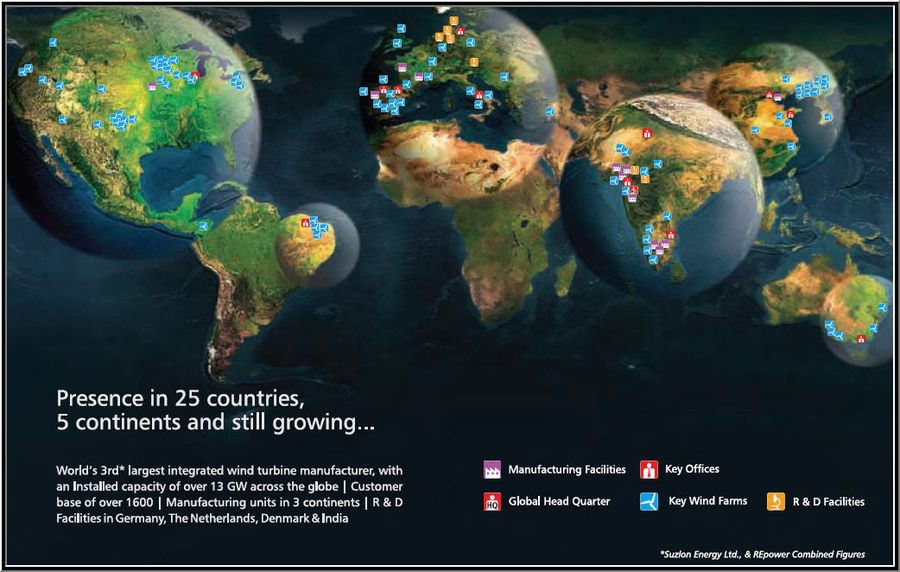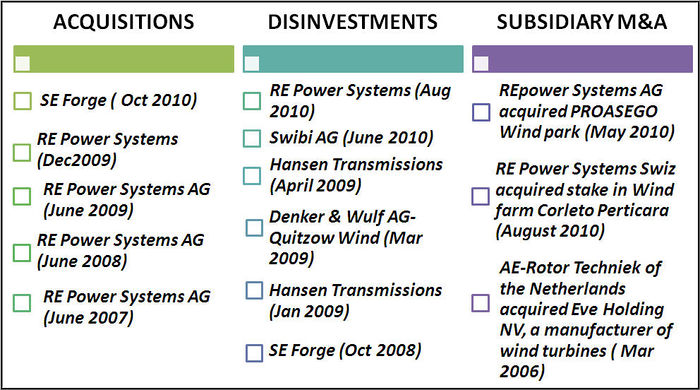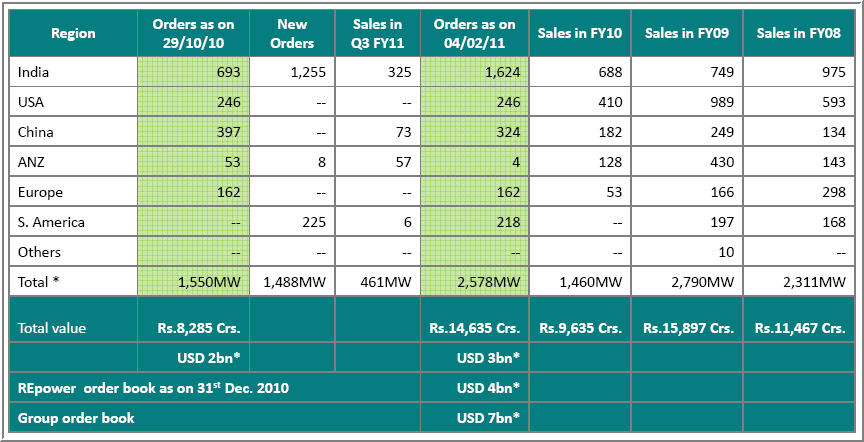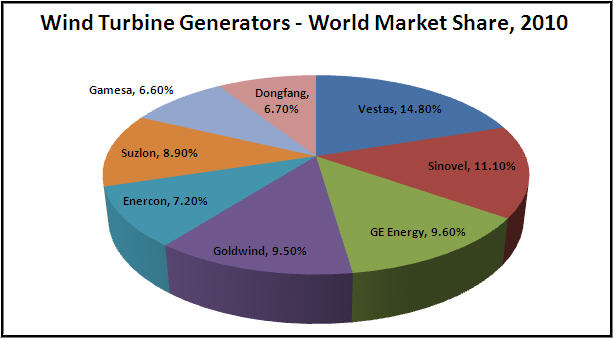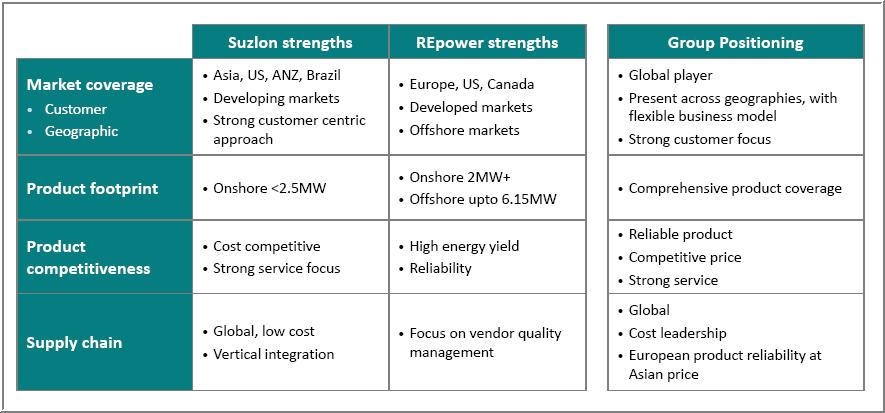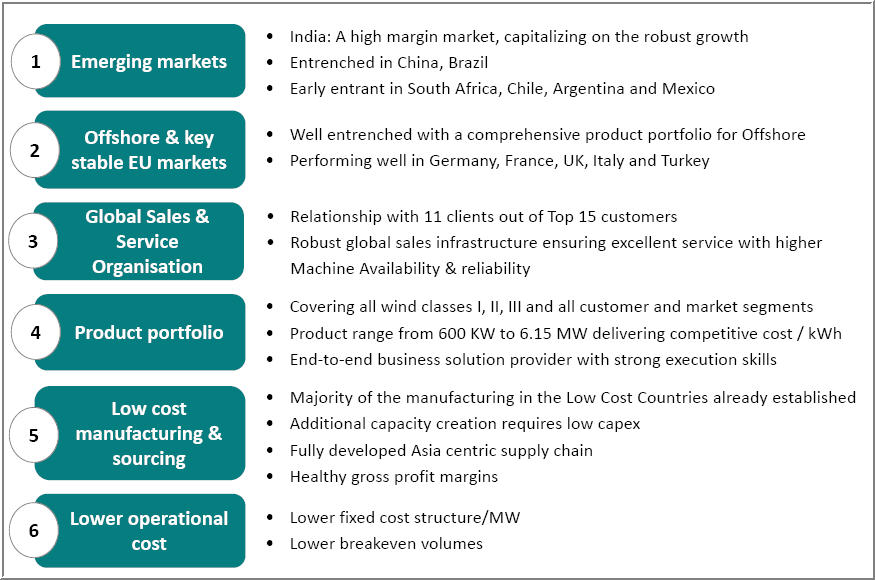Suzlon Energy
Summary
- Largest wind turbine manufacturer in Asia and the 3rd largest worldwide (Suzlon + RE Power)
- End-to-end wind power solutions from assembly, installation to commissioning. The company manufactures blades and generators
- Suzlon was founded by Tulsi Tanti in 1995
- Suzlon operates the largest wind park in the world, the 584 MW wind park in the Western Ghats-Tamil Nadu, India
- Planning to acquire remaining 9% stake in Repower
Contents
[hide]Company Overview
Suzlon Energy (Suzlon) is engaged in the manufacture and sale of wind turbine generators (WTGs) and components. It provides various wind energy solutions including wind resource mapping, site identification and development, installation, operation, and maintenance services. The company has operations across Americas, Asia, Australia, and Europe. It is headquartered in Pune, India and employs about 16,000 people.
The company recorded revenues of INR206, 196.6 million ($4,330.1 million) during the financial year ended March 2010 (FY2010), a decrease of 20.9% compared to FY2009. The operating profit of the company was INR6, 125 million ($128.6 million) during FY2010, a decrease of 77% compared to FY2009. The net loss was INR9, 825.6 million ($206.3 million) in FY2010, compared to a net profit of INR2, 364.8 million ($49.6 million) in FY2009.
Key Facts
| Head Office | One Earth , Opp. Magarpatta City Hadapsar Pune 411 028 India |
| Phone | 91 20 4012 2000 |
| Fax | 91 20 4012 2100 |
| Web Address | http://www.suzlon.com |
| Employees | 16000 |
| Turnover (US $M) | 4330 |
| Financial Year End | March |
Business Overview
Suzlon's wind energy business traces its roots back to the incorporation of Suzlon Energy Limited in 1995 by the venture of Mr. Tulsi R. Tanti. The company along with its subsidiaries engages in designing, developing and manufacturing of wind turbine generators and related components such as rotor blades, control panels, nacelle cover, tubular towers, generators and gearboxes. Further, the company also provides consultancy, design, manufacturing, installation, operation and maintenance services as well as is involved in wind resource mapping, identification of suitable sites and technical planning of wind power projects. The company principally operates in India, China, The Americas, Europe, New Zealand, South Korea, South Africa and Australia.
The company has forged ahead with an ethos of innovation in everything that it does. This has led to pioneering approaches and offerings such as a fully vertically-integrated value chain, leveraging local expertise and global experience, an 'end-to-end solutions' model and highly customized products – all contributing to make Suzlon the highest-growth, highest-margin wind turbine maker in a highly competitive environment. Suzlon's design, manufacture, operations and maintenance services have been certified as ISO 9001:2000 by Det Norske Veritas. It has a strong presence in the BSE as well as a part of S&P CNX Nifty Index (NSE) that shows investors’ satisfaction towards the company and the stability of its stock in the financial market.
Product & Services
Product Portfolio
- Wind Turbine Generator, Low to Medium capacity (350 kW – 2.1 MW)
- Wind Turbine Generator, Medium to High capacity (1.5 MW – 5 MW)
- Wind Turbine Generator Gearbox (500 kW – 6 MW; 160 – 3,500 kNm)
Service Portfolio
- Wind Resource Mapping
- Identification & Procurement of Sites
- Execution of Project Work
- Erection & Commissioning of Wind Turbine Generators
- Construction of Power Evacuation Facilities
- Operation & Maintenance Services
Geographic Presence
Key Executives
| Name | Title |
| Tulsi Tanti | Founder, Chairman, Managing Director, Chairman of Employees Stock Option Plan Committee, Chairman of Securities Issue Committee and Member of Investors Grievance Committee |
| Robin Banerjee | Chief Financial Officer |
| Andris Cukurs | Chief Executive Officer of USA |
| Dan Kofoed Hansen | Chief Executive Officer of Australia & New Zealand and Vice President of Sales & Marketing - Asia Pacific |
| Per Hornung Pedersen | Chief Executive Officer of Europe |
| Silas Zimu | Chief Executive Officer of South African Operations |
| Ashok D'Sa | President of India South Asia and Middle East |
| Arvind Mathew | President of Nacelle Manufacturing |
| Nilesh Vaishnav | President of Blades |
- Biography of CMD, Tulsi Tanti
Tulsi Tanti is from Gujarat, India where he started his first venture which was in textiles but he found the prospects stunted due to infrastructural bottlenecks. The biggest of them all was the cost and unavailability of power, which formed a high proportion of operating expenses of textile industry. In 1990, he invested in two wind turbine and realized their huge potential. In 1995, he formed Suzlon and gradually quit textiles. This is how he set out on a new path.
The $10 billion Suzlon Energy is his wind power based company that has expanded its operations into various parts of the globe. With this successful venture, Tanti is amongst the ten richest Indians and one of the most successful entrepreneurs in Asian region. With a net worth of $5.9 billion, he is the chairman and managing director of Suzlon energy. Tanti owns 70% of the company with his three siblings.
Investment History
Source: Suzlon Valuation Analyst Report
Order Book
(*Exchange rate: 1st February 2011: 1 EUR= 1.3742 USD, 1 USD= 45.7950 INR)
Source: Factiva News Articles, Analyst Reports
Market Overview
(*Suzlon 6.9% plus RE Power 2%)
Source:BTM Consult
- Market Share of Suzlon Wind Energy for 3 years from different sources (Excluding RE Power)
| Source | 2010 | 2009 | 2008 |
| BTM Consult | 6.9 | 6.4 | 7 |
| Make Consulting | 6 | 5.8 | 7 |
- India
Suzlon is the dominant provider in India, with a 50% market share in 2009. Enercon and Vestas have aggressively
targeted the Indian market over the past 3 years, in part driven by the slowdown in developed markets. Suzlon has maintained
its share. In India, many of Suzlon’s customers are small in size, and Suzlon provides the land as well as the infrastructure. This
land bank of premium sites is an important barrier to entry.
- Brazil
Suzlon is market leader in Brazil with a 50% share. Source:MAKE Consulting Report
- China
Chinese providers (Sinovel, Goldwind and DongFang Electric) are expected to continue to dominate the Chinese market. Suzlon
has launched a price competitive product to compete with local players. A small market share would have a material impact on
Suzlon due to the large size of the addressable market. Suzlon said in August 2010 that it hopes to generate up to 1/3 of its
revenues from China, although it subsequently appears to have reduced this emphasis. The presence of Chinese companies
outside China is minimal, held back by the perception that they produce low price, but low quality turbines.
Competitive Advantage
Integration is a key advantage for Suzlon, setting it apart from most of its competitors. This helps to maintain quality standards
and compatibility and is particularly important for gearboxes. Suzlon remains the dominant shareholder in Hansen and the two
companies have long term supply agreements in place. Hansen is also developing a customised gearbox for RePower. If Suzlon
sells its stake in Hansen, some of this advantage may be eroded.
Source:Analyst Reports
Strategic Position
Source:Analyst Reports
SWOT Analysis
| Strengths | Weaknesses |
| 1. Integrated business model 2. In house technology and design capabilities 3. Market leadership in India and global presence 4. Prudent acquisitions and alliances 5. Global production 6. Pricing power 7. Diversified product line |
1. Operational risk 2. Growth in assets diminishing growth in profits 3. Unsupportive stock prices 4. Unfavorable ratings 5. Improper working capital management 6. Weak strategic financial management |
| Opportunities | Threats |
| 1. Environmental awareness 2. Government initiatives 3. Untapped offshore market 4. Steady growth in demand 5. Vast coastlines of India and low cost |
1. Intense competition 2. Foreign exchange risk 3. Technology risk 4. Objections to wind power |
